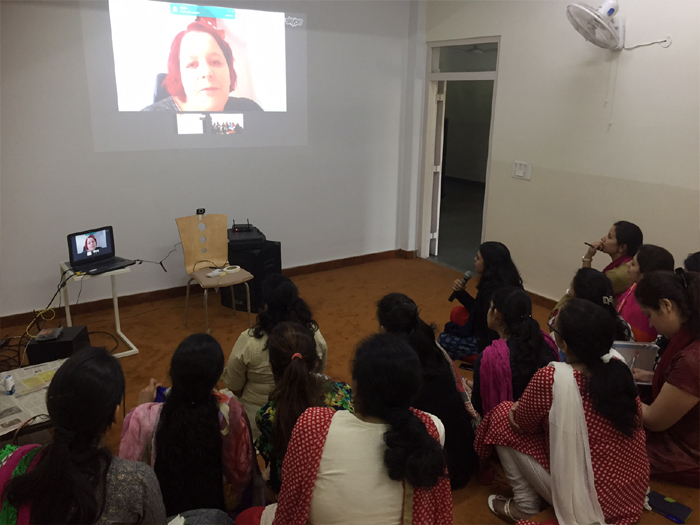Teacher training by video conference with a Finnish educator.
Finland is Europe's largest archipelago and gained independence in 1917. Initially, it was one of the least advanced economies in Europe, but today, it is one of Europe's richest and most successful nations. One of the secrets of Finland's success is a high level of public investment in education and training. In fact, Finland's education system is one of the best in the world and develops people with the right skills to succeed in a modern knowledge economy. In a study analysing the education of children by OECD (The Organisation for Economic Co-operation and Development), Finnish children achieved the highest overall scores.
The Indian School's 13 teachers; Ms. Sukmeen Kaur Cheema (Vice Principal), Ms. Chanda Sharma, Ms. Priya Sharma, Ms. Rupinder Kaur, Ms. Mahima Kapoor, Ms. Radhika Prabhaker, Ms. Rakhi Prasad, Ms. Aprajita Chandok, Ms. Vandana Tiwari, Ms. Priya Manchanda, Ms. Mehak Gumber, Ms. Pratima Roy and Ms. Tavleen Kaur had the opportunity to participate in a video conference on February 23rd, 2017 to share the ideologies and methods of effective teaching with Ms. Paula Vorne in Finland. Ms. Vorne is vice principal, an educator, a teacher trainer, a Microsoft expert educator and a Microsoft innovative educator fellow.
[gallery link="file"]
The session started at noon, with a brief introduction about the trainer and the school she teaches at. Warm greetings were exchanged by both sides. Ms. Vorne then spoke about the system of education in Finland. She discussed the education system of the country level-wise, from pre-primary to primary, middle school and high school.
Our teachers were shown a power point presentation to throw light on the education system of Finland. The speaker shared her thoughts on why children begin education at the age of six in Finland and the system of compulsory education in her country from the age of seven, until age 16. Beyond this stage, students attend either general upper secondary school or vocational upper secondary school. General upper secondary school lasts for three years and leads to university, typically a five-year programme of study, ending in a Masters' Degree. Vocational school is also a three-year programme leading to the polytechnic, typically a three-year course of study ending in a BA. She discussed her new pedagogy which is based on ICT skills and knowledge content.
Ms. Vorne discussed the role of the teacher in detail and told the teachers to teach the children to make good questions in order to find or get good answers! The key element to bringing in any kind of change, she said, is to try new things and be experimental. She guided the teachers to focus on the strength of the children and see their mistakes as points of learning.
After her valuable inputs, Ms. Vorne answered the questions of her enthusiastic listeners. The teachers asked questions on how they should introduce a new topic in the class, duration of school hours, the type of time table they should follow, activities to better engage the children in, etc. She answered them all completely and offered many suggestions.
Our teachers enjoyed the session and it ended on a happy note with both sides getting introduced to words in each others' lingos!
Ms. Radhika Prabhaker.













